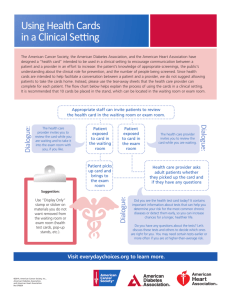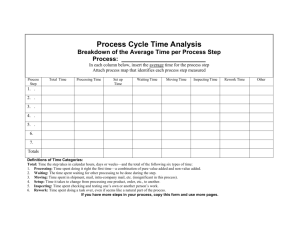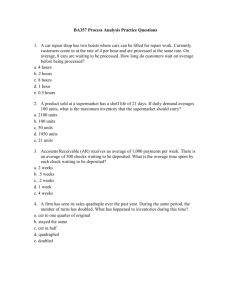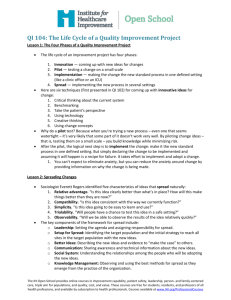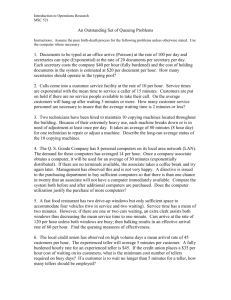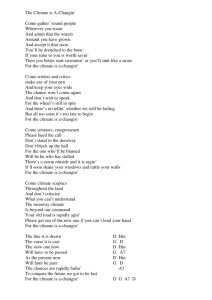Saving the World or Wasting Time
advertisement
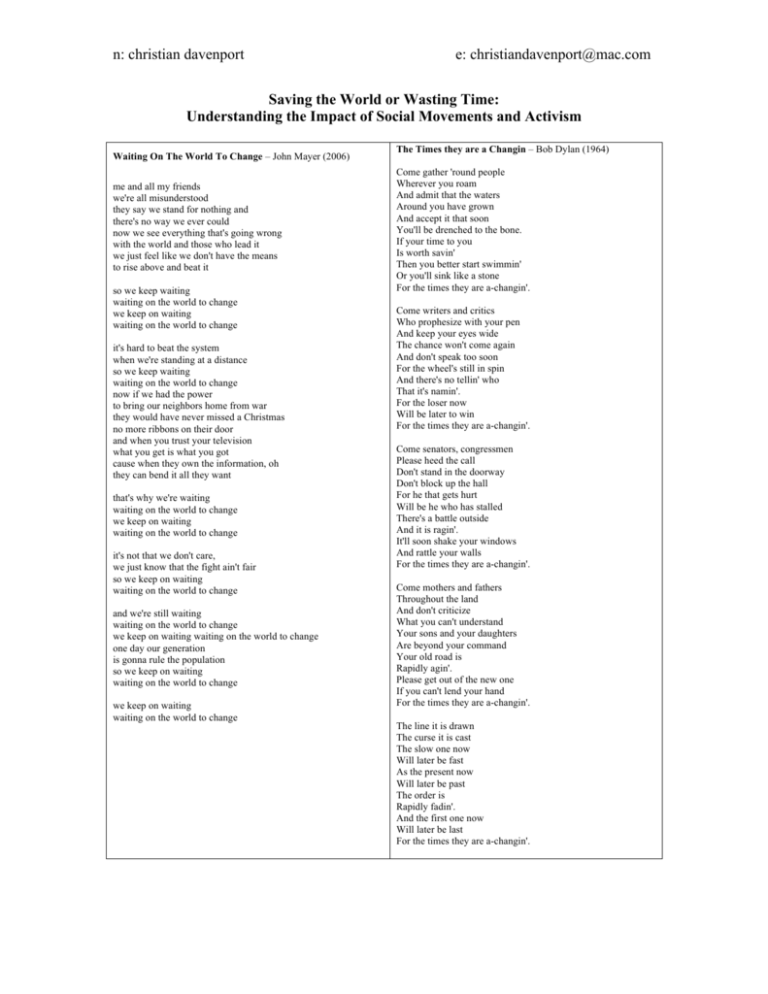
n: christian davenport e: christiandavenport@mac.com Saving the World or Wasting Time: Understanding the Impact of Social Movements and Activism Waiting On The World To Change – John Mayer (2006) me and all my friends we're all misunderstood they say we stand for nothing and there's no way we ever could now we see everything that's going wrong with the world and those who lead it we just feel like we don't have the means to rise above and beat it so we keep waiting waiting on the world to change we keep on waiting waiting on the world to change it's hard to beat the system when we're standing at a distance so we keep waiting waiting on the world to change now if we had the power to bring our neighbors home from war they would have never missed a Christmas no more ribbons on their door and when you trust your television what you get is what you got cause when they own the information, oh they can bend it all they want that's why we're waiting waiting on the world to change we keep on waiting waiting on the world to change it's not that we don't care, we just know that the fight ain't fair so we keep on waiting waiting on the world to change and we're still waiting waiting on the world to change we keep on waiting waiting on the world to change one day our generation is gonna rule the population so we keep on waiting waiting on the world to change we keep on waiting waiting on the world to change The Times they are a Changin – Bob Dylan (1964) Come gather 'round people Wherever you roam And admit that the waters Around you have grown And accept it that soon You'll be drenched to the bone. If your time to you Is worth savin' Then you better start swimmin' Or you'll sink like a stone For the times they are a-changin'. Come writers and critics Who prophesize with your pen And keep your eyes wide The chance won't come again And don't speak too soon For the wheel's still in spin And there's no tellin' who That it's namin'. For the loser now Will be later to win For the times they are a-changin'. Come senators, congressmen Please heed the call Don't stand in the doorway Don't block up the hall For he that gets hurt Will be he who has stalled There's a battle outside And it is ragin'. It'll soon shake your windows And rattle your walls For the times they are a-changin'. Come mothers and fathers Throughout the land And don't criticize What you can't understand Your sons and your daughters Are beyond your command Your old road is Rapidly agin'. Please get out of the new one If you can't lend your hand For the times they are a-changin'. The line it is drawn The curse it is cast The slow one now Will later be fast As the present now Will later be past The order is Rapidly fadin'. And the first one now Will later be last For the times they are a-changin'. n: christian davenport e: christiandavenport@mac.com Introduction We are in this class to learn about how we can and cannot improve our world by engaging in activism. Attendance: Show up, learn, contribute (20% of the grade) and do not lose points for missing quizzes Grading: Participation: 15% - contributing to classroom discussion through informed commentary/reflection about reading and/or prior discussion Individual Examination: 40% - one formal test (25%) - an undisclosed number of informal quizzes, administered randomly throughout the semester (15%) o if a quiz is missed and there is no University sanctioned excuse, then the student will be issued a “0” for the assignment. o if missed is missed and there is a University sanctioned excuse, then the student will be given a make-up examination. Group Assignment: 20% - all team members must participate, overall product must be divided across team members (what is being pursued, why does the problem exist, what strategies were applied to fix the problem, what would success look like and was the effort successful) and all components of the assignment must be submitted in class on the due date Individual Final Submission: 25% - format to be determined Orientation and Introduction – September 8 Sense it Reading: Two Cups of Tea: One Man’s Mission to Promote Peace…. One School at a Time – Greg Mortenson and David Oliver Relin September 10, 15 Small Acts of Resistance: How Courage, Tenacity and Ingenuity Can Change the World n: christian davenport e: christiandavenport@mac.com – Steve Crenshaw and John Jackson September 17, 22 Reading for another time: The Activists Handbook – Randy Shaw, University of California Press, 2001 An Action a Day Keeps Capitalism Away – Mike Hudema, Between the Lines, 2004 Its Your World, If you Dont Like it Change it – Mikki Halpin, Simon Pulse, 2004 Be the Change – Michele Nunn (editor), Hundreds of Heads Books, 2006 How to Save the World in Your Spare Time – Elizabeth May, Key Porter Book, 2007 Steal This Book – Abbey Hoffman, Four Walls Eight Windows, 1995 Study it: What we know Reading (read articles for each class): Amenta, Edwin, Drew Halfmann & Michael P. Young (1999): “The Strategies and Contexts of Social Protest: Political Mediation and the Impact of the Townsend Movement in California,” Mobilization 4: 1-24. September 24 Giugni, Marco G. (1998): "Was It Worth the Effort? The Outcomes and Consequences of Social Movements," Annual Review of Sociology 24: 371-393. September 29 Hafner-Burton, Emilie. “Sticks and Stones: Can Naming and Shaming Solve Human Rights Enforcement Problems? Manuscript. http://www.princeton.edu/~ehafner/pdfs/sticks_stones.pdf October 1 King, Brayden and Sarah A. Soule. “Social Movements as Extra-Institutional Entrepreneurs: The Effect of Protest on Stock Price Returns.” Administrative Science Quarterly, September 2007. October 6 n: christian davenport e: christiandavenport@mac.com Linders, Annulla (2004): “Victory and Beyond: A Historical Comparative Analysis of the Outcomes of the Abortion Movements in Sweden and the United States,” Sociological Forum 19: 371-404. Luders, Joseph (2006): “The Economics of Movement Success: Business Responses to Civil Rights Mobilization,” American Journal of Sociology 111: 963-998. October 8 (Guest) McAdam, Doug and Yang Su. 2002. "The War at Home: The Impact of Anti-War Protests, 1965-1973," American Sociological Review 67: 696-721. McCammon, Holly J., Karen E. Campbell, Ellen M. Granberg & Christine Mowery (2001): “How Movements Win: Gendered Opportunity Structures and U.S. Women’s Suffrage Movements, 1866 to 1919,” American Sociological Review 66: 49-70. October 13 McVeigh, Rory, Michael R. Welch & Thoroddur Bjarnason (2003): “Hate Crime Reporting as a Successful Social Movement Outcome,” American Sociological Review 68: 843-867. October 15 (Guest) Soule, Sarah A. & Susan Olzak (2004): “When Do Movements Matter? The Politics of Contingency and the Equal Rights Amendment,” American Sociological Review 69: 473-497. Tauber, Steven (1998): “On Behalf of the Condemned? The Impact of the NAACP Legal Defense Fund on Capital Punishment Decision Making in the U.S. Courts of Appeals.” Political Research Quarterly 51(1): 191-219 October 22 [receive group assignments] Pick any two readings: Rojas, Fabio (2006). “Social Movement Tactics, Organizational Change and the Spread of African American Studies.” Social Forces 84(4): 2139-2158. Deng, Fang (1997): “Information Gaps and Unintended Outcomes of Social Movements: The 1989 Chinese Student Movement,” American Journal of Sociology 102: 1085-1112. n: christian davenport e: christiandavenport@mac.com Meyer, David S. & Steven A. Boutcher (2007): “Signals and Spillover: Brown v. Board of Education and Other Social Movements,” Perspectives on Politics 5: 81-94. October 27 Pick any two readings: Markoff, John (1997): “Peasants Help Destroy and Old Regime and Defy a New One: Some Lessons from (and for) the Study of Social Movements,” American Journal of Sociology 102: 1113-1142. Soule, Sarah A. and Brayden King. 2006. “The Impact of Social Movements at Stages of the Policy Process: The Equal Rights Amendment, 1972-1982.” American Journal of Sociology 111(6): 1871-1909. Stearns, Linda Brewster & Paul D. Almeida (2004): “The Formation of State Actor-Social Movement Coalitions and Favorable Policy Outcomes,” Social Problems 51: 478-504. October 29 Midterm Examination – November 3 Evaluate it: Rumors of a Better World Successes or Failures?! – [Group Assignments] November 5, 10, 12, 17, 19, 24 Build It: Each one, Revolutionize one Successes or Failures?! – [Group Assignments] December 1, 3, 8, 10 Final Submission – During Examination Period (Change Something)
